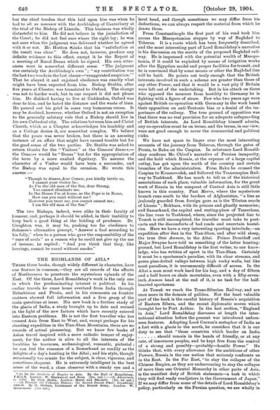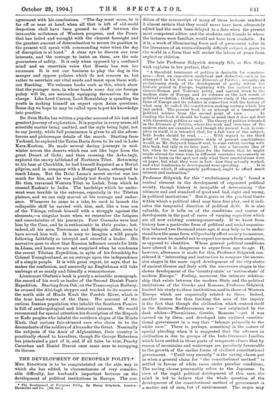'THESE three books, though widely different in character, have one
feature in common,—they are all records of the efforts ef Northerners to penetrate the mysterious uplands of the East. Of the three, Lord Ronaldshay's work is the only one in which the predominating interest is political. In his earlier travels be came home overland from India through Beluchistan and Persia, and in his comments on frontier matters showed full information and a firm grasp of the main questions at issue. His new book is a further study of the ghtcis of India, a study brought up to date and revised in the light of the new factors which have recently entered into Eastern problems. He is not the first traveller who has crossed Asia from East to West, and, except perhaps for his shooting expedition in the Tian-Shan Mountains, there are no records of actual pioneering. But we know few books of Asian travel inspired with a more catholic temper of enjoy- ment, for the author is alive to all the interests of the localities he traverses, archaeological, romantic, pictorial ; he can feel the romance of a Samarkand as readily as the delights of a day's hunting in the Altai ; and his style, though occasionally too ornate for the subject, is clear, vigorous, and sometimes eloquent. He is extremely intelligent in the best sense of the word, a close observer with a steady eye and a • (1) On the Outskirts of Empire in Asia. By the Earl of Bonaldshay, F.E.U.S. London: W. Blackwood and Sons. [21s. net.]—(2) Adventures to Tibet. By Sven Bodin. London: Hurst and Blackett. [10s. 6d. net.] —(3) Through the Unknown Pamirs: the Second Danish Pcemsr Expedition. isss-ns. By 0. Olafson, Lieutenant of the Danish Army. London: W. licineumun. [15s. net.]
level head, and though sometimes we may differ from bis deductions, we can always respect the material from which he draws them.
From Constantinople the first part of his road took him across the Mesopotamian steppes by way of Baghdad to Teheran. It is a route which has been frequently described, and the most interesting part of Lord Ronaldshay's narrative is his discussion on the merits of the proposed Baghdad rail- way. He is impressed with the potential wealth of Mesopo- tamia, if it could be exploited by means of irrigation works after the Egyptian model and proper facilities for transit, and he is convinced that by some means or other the Baghdad line will be built. He points out truly enough that the British interests involved in such a scheme are greater than those of any other Power, and that it would be a vast pity if Britain were left out of the undertaking. But in his attack on those who opposed the measure from hostility to Germany he is fighting with a figure of straw. Few who two years ago were against British co-operation with Germany in the work based their opposition on anti-Teutonic bias or a denial of the im- portance of the railway. The true ground of opposition was that there was no real provision for an adequate safeguarding of British interests. As Lord Ronaldshay himself admits, any co-operation must be on terms, and the terms, in our view, were not good enough to cover the commercial and political risks.
We have not space to linger over the most interesting accounts of the journey from Teheran, through the gates of Persia, to Baku on the Caspian. In substance Lord Ronald- shay confirms Mr. Chirol's narrative of Persian incapacity, and the hold which Russia, at the expense of a large capital outlay, has got upon the north of the country and certain branches of the administration. From Baku he crossed the Caspian to Krasnovodsk, and followed the Transcaspian Rail- way to Tashkend. He has much to tell us of the historical associations of each place, valuable information, for the great work of Russia in the conquest of Central Asia is still little known in this country. Past Merve, where the mysterious branch runs south to the borders of Afghanistan, " a line as jealously guarded from foreign gaze as is the Tibetan oracle of Lhassa " ; Bokhara, with its prisons and ghastly memories; and Samarkand, the capital and resting-place of Tamerlane, the line runs to Tashkend, where, since the projected line to Tomsk is still uncompleted, the traveller must take to post- carts and the discomforts of bad roads and uncertain hostel- ries. Here we have a very interesting sporting interlude,—an expedition after ibex in the Tian-Shan, and after wild sheep, the true Ovis Ammon, in the Altai. Prince Demidoff and Major Swayne have told us something of the latter hunting- ground, but Lord Ronaldshay is the first writer, to our know- ledge, who has written of sport in the Tian-Shan. Certainly it must be a sportsman's paradise, with its clear streams, and green pine-dotted valleys between high rocky walls, but like most paradises, it is uncommonly difficult of access. In the Altai a man must work hard for his bag, and a day of fifteen and a half hours on shale mountains, even with a fifty-seven- inch Ammon head at the end of it, is no task for the half- hearted sportsman.
At Tomsk we reach the Trans-Siberian Railway, and are once more in the domain of politics. Not the least valuable part of the book is the careful history of Russia's acquisition of Eastern Sibera, and the recent diplomatic moves which brought her to Port Arthur. In the last section, " England in Asia," Lord Ronaldshay discusses at length the inter- national situation before the present war introduced unfore- seen features. Adopting Lord Curzon's metaphor of India as a fort with a glacis to the north, he considers that it is our duty to see that " those countries which border on India should remain in the hands of friendly, or at any rate, of innocuous peoples, and be kept free from the control of a strong and possibly—probably—hostile Power." He thinks that, with every allowance for the ambitions of other Powers, Russia is the one nation that seriously confronts us in the East. In the Far East, " to stay the collapse of the Chinese Empire, as they are endeavouring to stay the collapse of more than one Oriental Monarchy in other parts of Asia, is the manifest duty of British statesmen—a task in which they will find ready coadjutors in the Government of Japan." If we may differ from some of the details of Lord Ronaldshay's policy, particularly on the Persian question, we are wholly in
agreement with his conclusions. " The day must come, be it far off or near at hand, when all that is left of old-world despotism shall have been ground to chaff between the inexorable millstones of Western progress, and the Power that has toiled and wrought with the clearest foresight and the greatest amount of determination to secure its position in the present will speak with commanding voice when the day of disruption is at band." A clear eye to discern our true interests, and the courage to insist on them, are the sole guarantees of safety. It is only when opposed by a confused mind and an uncertain voice that Russia has won her successes. It is not our business to play the dog in the manger and oppose policies which do not concern us, but rather to ascertain our vital needs and insist upon them with- out flinehing. We welcome books such as this, which show that the younger men, in whose hands some day our foreign policy will lie, are seriously equipping themselves for the charge. Like Lord Curzon, Lord Ronaldshay is spending his youth in making himself an expert upon Asian questions. Some day we hope he may be called upon to put his knowledge into practice.
Dr. Sven Hedin has written a popular account of his last and greatest journey of exploration. It is popular in every sense, all scientific matter being omitted, and the style being light, not to say jaunty, while full prominence is given to all the adven- turous and picturesque details of the march. Starting from Yarkand, he explored the Tarim Dania down to its end in Lake Kara-Koshun. He made several daring journeys in mid- winter across the deserts which run out like bays from the great Desert of Gobi; and then crossing the Arka-tagh, explored the snowy tableland of Northern Tibet. Returning to his base at Charkhlik, he had himself disguised as a Buriat pilgrim, and in company with a Mongol Lama, attempted to reach Lhasa. But the Dalai Lama's secret service was too much for him, and he was politely but firmly turned back. He then traversed Western Tibet to Ladak, from which he crossed Kashmir to India. The hardships which he under- went were terrible in the extreme, especially in the Tibetan plateau, and we can only marvel at his courage and endur- ance. Whenever he came to a lake, he used to launch the collapsible skiff he carried with him, and, like a true son of the Vikings, refresh himself with a struggle against the elements,—a singular taste when we remember the fatigues and uncertainties of his journeys. Four Cossacks were lent him by the Czar, and he is enthusiastic in their praise ; but, indeed, all his men, Tureomans and Mongols alike, seem to have served him well. It is easy to imagine a wild people following faithfully so intrepid and cheerful a leader. His narrative goes to show that Russian influence counts for little in Lhasa, and hence we are not surprised when he condemns the recent Tibetan Expedition, in spite of his friendship for Colonel Younghusband, as an outrage upon the independence of a simple people. It is with great regret, he says, that he makes the confession, and assuredly no Englishman will take umbrage at so manly and friendly a remonstrance.
Lieutenant Olufsen's book is purely a scientific monograph, the record of his work as leader of the Second Danish Pamir Expedition. Starting from Osk, on the Transcaspian Railway, he crossed the Alai-tagh steppes and tracked to its source on the north side of Hindu Kush the Pandsh River, which is the true head-waters of the Oxus. His account of the curious Iranian population who inhabit the Southern Pamirs is fall of anthropological and historical interest. We would recommend for special attention his description of the Siaposh or Kafir peoples who inhabit the southern slopes of the Hindu Kush, that curious fair-skinned race who claim to be the descendants of the soldiers of Alexander the Great. Nominally the subjects of the Amir of Afghanistan, their country is practically closed to travellers, though Sir George Robertson has penetrated a part of it, and, if all tales be true, Peachy Carnehan and Daniel Dravot once came near to occupying its throne.



















































 Previous page
Previous page